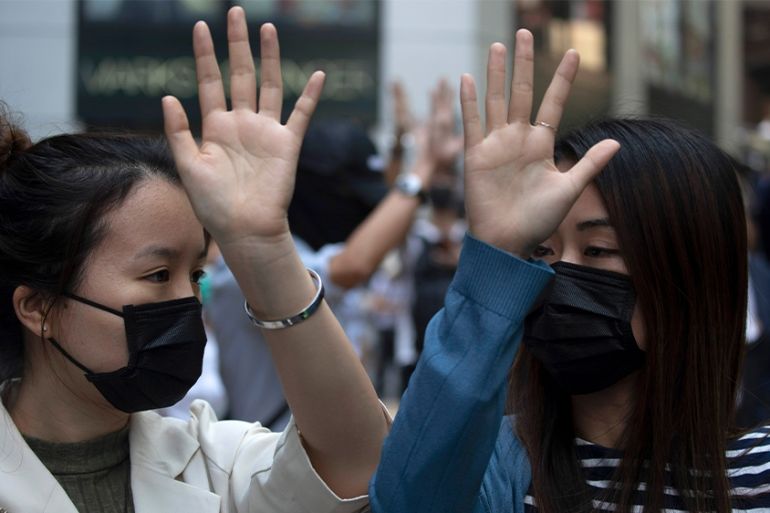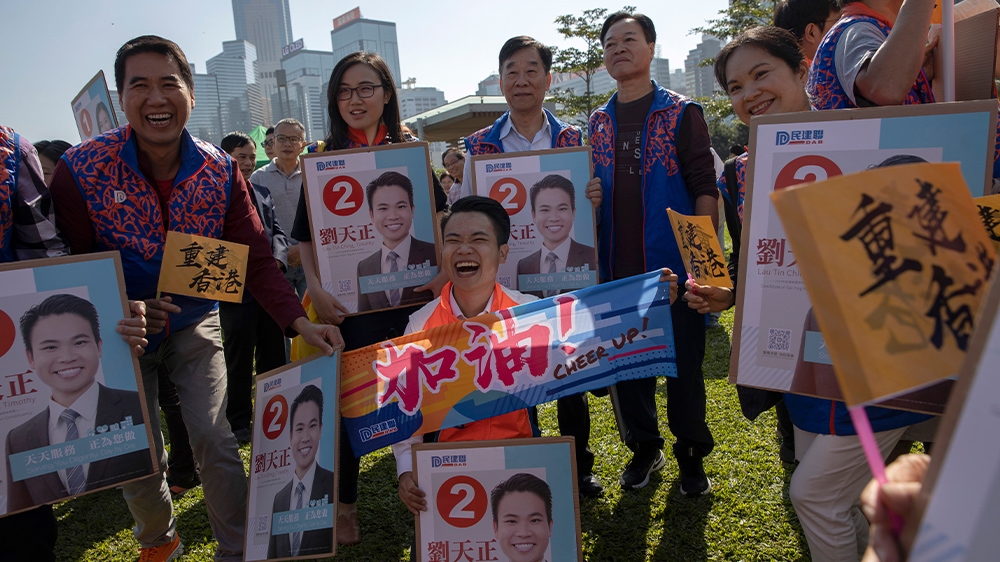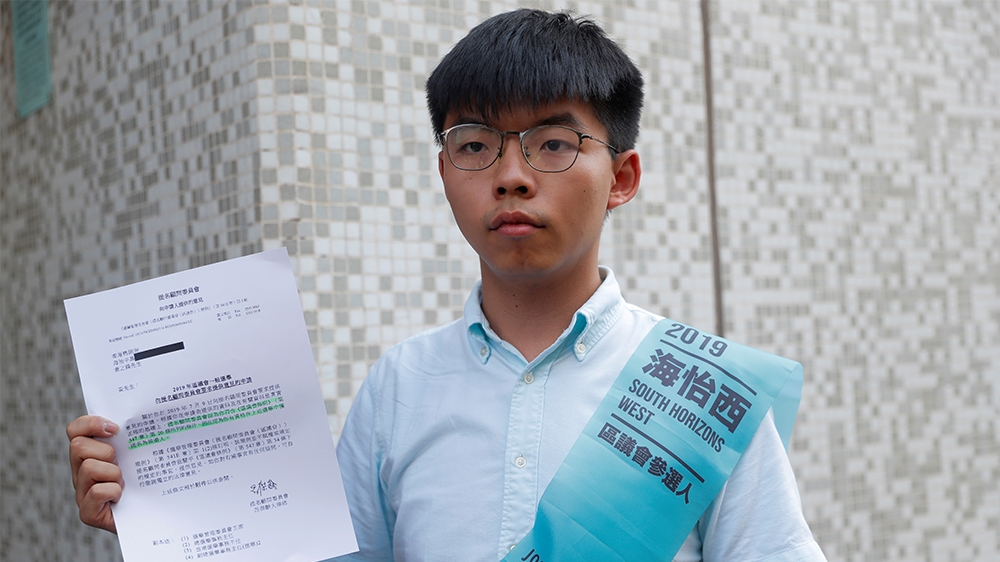Record number to vote in pivotal Hong Kong district election
Vote scheduled for Sunday after more than five months of increasingly violent protests in semi-autonomous Chinese city.

Hong Kong, China – On her first night out leafleting, Janelle Leung was hit on the head by an assailant and hospitalised for a minor concussion.
Brushing aside her mother’s plea for her to drop out of the race, Leung is standing as a candidate in this Sunday’s district council elections in Hong Kong.
Keep reading
list of 3 itemsThis is what it’s like inside besieged Hong Kong campus
Hong Kong protests: What is the end game?
“I want to use my example to show we’re undeterred,” said Leung, 25, an accountant with a big four firm. “For me, campaigning is also a form of resistance. I want to be able to have influence over our government outside protests.”
Since early June, the semi-autonomous Chinese city has been rocked by protests triggered by a bill that would have allowed people to be extradited to mainland China to stand trial.
Leung is among a slew of independent candidates galvanised by the anti-government demonstrations to take their fight from the streets to the ballot box.
Amid heightened security, polling stations will open at 7.30am on Sunday (23:30 GMT on Saturday) and close at 10.30pm (14:30 GMT).
Although officials formally withdrew the bill last month, public anger remains intense driven by the authorities’ refusal to address protesters’ demands for an independent inquiry against alleged police brutality; amnesty for the more than 1,000 people charged with offences stemming from the protests; a retraction of police claims that protesters are guilty of rioting; and universal suffrage to elect the full legislature and chief executive.
Grassroots democracy
At the moment, district councils are the only wholly-democratic level of government in the territory having evolved from colonial-era local advisory boards whose members were appointed to fully-elected bodies.
As recently as the last election cycle four years ago, 66 district councillors were returned unopposed.

This time, amid heightened political tension and continuing demonstrations, there will be a contest for every seat in the 18 district councils and more people than ever have signed up to vote.
In particular, registered voters aged between 18 and 35 years old alone spiked by more than 12 percent, with 4.1 million people now on the roll, a record high.
But the campaign season has also been marred by attacks and arrests.
Several democratically-leaning candidates, like Leung, have been assaulted; a dozen others of similar political leanings were caught up in protests and apprehended.
A glaring absence from the ballot paper is Joshua Wong, the face of the pro-democracy Umbrella Movement of 2014. Electoral officials barred him from running after a controversial political screening that was instituted three years ago.
Tommy Cheung, 25, also a student leader during Umbrella, is determined to ride the tide of the protests to unseat an incumbent.
“In this political climate, I’ve found voters’ concerns are no longer as local. Of course, they still care about unclogging the sewer lines and patching up the pavement – all that is compulsory,” said Cheung. “But they also expect their candidate to share their political values and take a strong stand.”
Cheung is running for a seat in the suburban district of Yuen Long, where four months ago suspected triad members assaulted protesters with iron rods and police failed to respond to thousands of calls for help.
The attack marked a turning point in the protests, deepening suspicions about police as some accused the force of colluding with gang elements. The police have denied the claims.

Recently Cheung’s opponent in the district abstained on a vote to investigate the police.
In a snatched conversation as the 25-year-old made his way to a campaign stop, Cheung said his rival’s decision had given him more ammunition to use on the stump.
Outcome hard to predict
For the protesters and democratically-leaning voters, winning a larger share of seats will give them more say over electing a chief executive who is chosen by a small body of Beijing loyalists. District councillors account for 10 percent of the total 1,200 votes for the post.
For both the independent and the pan-democratic candidates, their shared enemies are the pro-establishment politicians. In the last district election, the pro-Beijing side won nearly 200 seats. All eyes are on whether they will be able to maintain that position or be swept out of office.
With a campaign season truncated by ongoing protests and largely absent from the media, observers say the outcome is hard to predict.
|
|
“The current protests should have some impact, but the extent is uncertain. The question is to what extent the protest would help defeat the establishment,” Francis Lee, a journalism professor and pollster at the Chinese University of Hong Kong, told Al Jazeera.
He noted that some of the local politicians have worked hard for their constituents and won their respect.
“The pro-establishment camp has more resources and a well-oiled electoral machine. Some of the incumbents have a good relationship with the local residents and can win” even though they’re pro-government and Beijing.
In the last cycle, the pan-democratic camp took between 25 and 30 percent of the seats. Often they gave up on districts where they decided there was little chance of winning.
Leung’s district is one democrats once avoided, and she hopes to beat the 12-year incumbent with her team of fresh-faced professionals.
Still, she is finding politics are local – she is campaigning on parking and hygiene issues – in places not as politicised as Yuen Long.
As for Cheung, the student leader turned candidate, he is learning that in pursuit of democracy, it helps to reassure voters that their more mundane concerns will also be addressed.
“You can’t just talk about ideals because you’ve got campaign promises to fulfil,” Cheung said.